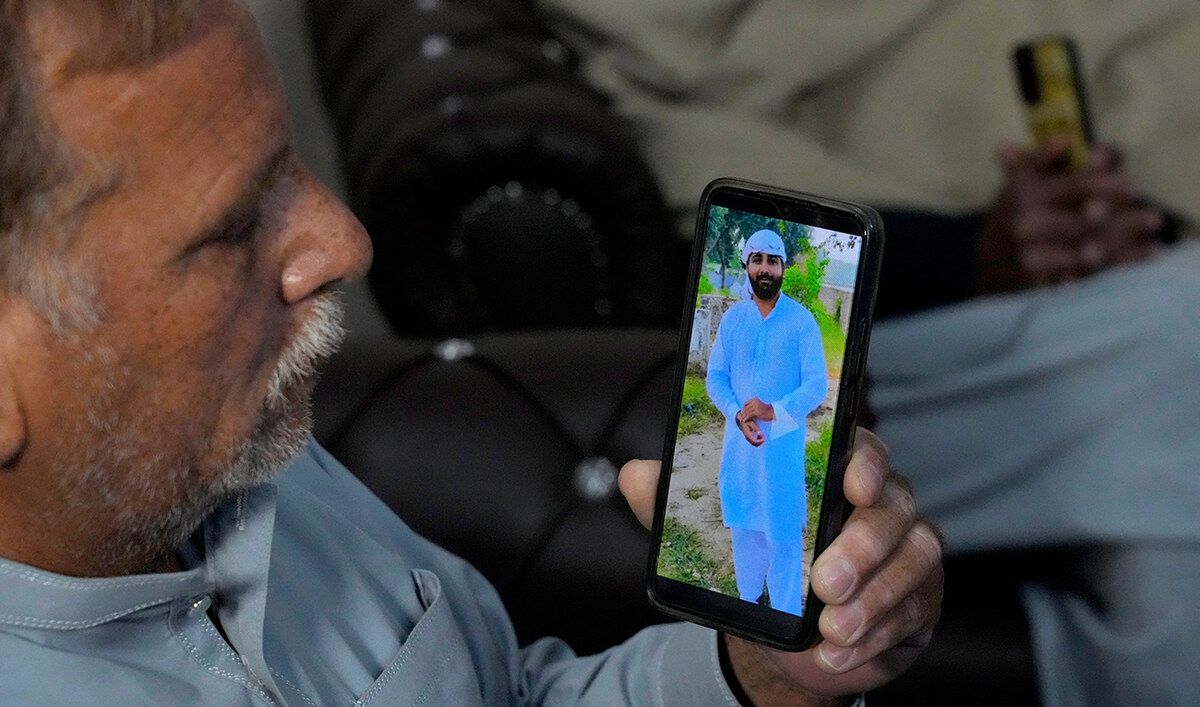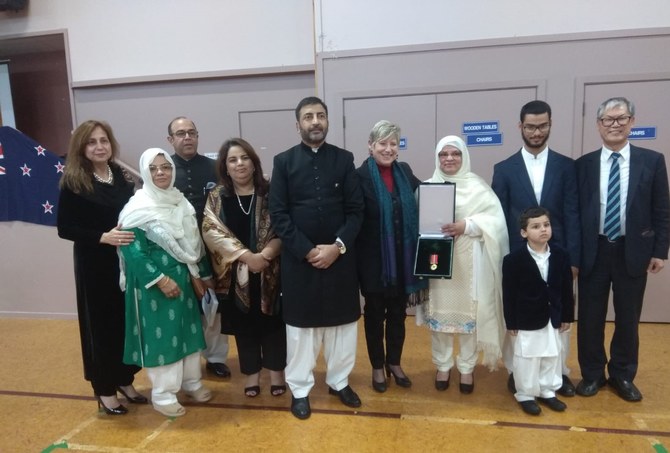ISLAMABAD: Pakistan conferred one its highest civilian awards on Christchurch Mosque hero Naeem Rasheed, said his widow Ambreen Naeem while talking to Arab News on Monday from her New Zealand residence as she prepared to break her fast on the first day of Ramadan without her husband and eldest son Talha.
Rasheed’s wife received Nishan-e-Shujaat – or Order of Bravery – on Saturday at an investiture ceremony attended by more than a hundred people at the Templeton Community Center in New Zealand. Notables were Christchurch Mayor Lianne Dalziel, Minister Megan Woods, senior Turkish diplomats, and Pakistan’s Deputy and High Commissioners.
“The medal was given to me by Pakistan’s High Commissioner, Mr. Abdul Malik,” she said, adding that “it was supposed to be given by the country’s president” but he was unable to undertake the trip.
Pakistan announced the award a few days after the brazen mosque attacks in which 50 people, including nine Pakistanis, were killed and many more were injured. The award was expected to be given on March 23, the Pakistan Day.
“All the high dignitaries came to the funeral including the MPs, mayors, and deans of universities. The award basically came from Pakistan, and the ceremony could only be organized after the burial process,” Naeem said while explaining the reason behind the delay in handing over the award.
Rasheed lost his life while trying to disarm 28-year-old Australian gunman, Brenton Tarrant, who launched two consecutive terrorist attacks at mosques in Christchurch, New Zealand, during Friday Prayer on March 15.
Tarrant livestreamed the attack and published a racist manifesto online.
One of his victims, Naeem Rasheed, could be seen in the video footage launching himself at the attacker at Masjid Al Noor in a bid to disarm him. He was gunned down but his act of valor distracted the shooter, allowing some worshippers to escape.
Rasheed’s 21-year-old son, Talha Naeem, was also killed in the attack and eye witnesses and relatives described his last few moments as having been spent shielding an Indian boy from the attacker.
“Very few people know about the heroic effort of my nephew [Talha],” Rizwan Rasheed, Naeem’s brother and a retired air force pilot, said earlier. “At the time of the shooting, he was offering his prayers. After being shot, he fell on the floor and there was a boy next to him ... he covered the boy and told him not to move as the shooter fired a second round to ensure everyone was killed.”
Naeem Rasheed, 50, was a Pakistani professor from the northwestern city of Abbottabad who migrated to New Zealand in 2009. His wife, who currently lives with her sister- and brother-in-law, said she would soon move to her own home.
Describing the feeling of emptiness in her life after losing two courageous family members, she said: “We all used to prepare Sehri and Iftaar together. I have a strong faith in Allah. I am trying my best to observe Ramadan with my children as we used to in the past, but this is going to be very difficult for us to cope with. I miss them a lot, I wish they were here with me. I pray for them a lot too.”
Pakistan confers award on Christchurch mosque hero for bravery
Pakistan confers award on Christchurch mosque hero for bravery

- Naeem Rasheed’s wife and children are spending their first Ramadan after the tragedy
- He was given Nishan-e-Shujaat posthumously at an investiture ceremony in New Zealand
PM launches World Bank’s $20 billion Country Partnership Framework for Pakistan

- 10-year-plan will focus on development issues like impact of climate change and boosting private-sector growth
- Last year, Pakistan secured $7 billion IMF loan deal though Sharif has vowed to reduce dependence on foreign loans
ISLAMABAD: Prime Minister Shehbaz Sharif on Thursday launched the World Bank’s Country Partnership Framework (CPF) for Pakistan, a plan to focus $20 billion in loans to the cash-strapped nation over the coming decade on development issues like the impact of climate change and boosting private-sector growth.
Pakistan in 2023 nearly defaulted on the payment of foreign debts when the International Monetary Fund rescued it by agreeing to a $3 billion bailout to Pakistan. Last year, Islamabad secured a new $7 billion loan deal from the IMF. Since then, the country’s economy has started improving with weekly inflation coming down from 27 percent in 2023 to 1.8 percent earlier this month. Sharif has vowed to reduce dependence on foreign loans in the coming years.
The World Bank’s lending for Pakistan will start in 2026 and focus on six outcomes: improving education quality, tackling child stunting, boosting climate resilience, enhancing energy efficiency, fostering inclusive development and increasing private investment.
“Together, this partnership fosters a unified and focused vision for your county around six outcomes with clear, tangible and ambitious 10-year targets,” Martin Raiser, the World Bank vice president for South Asia, said in an address at the launch ceremony of the loan program.
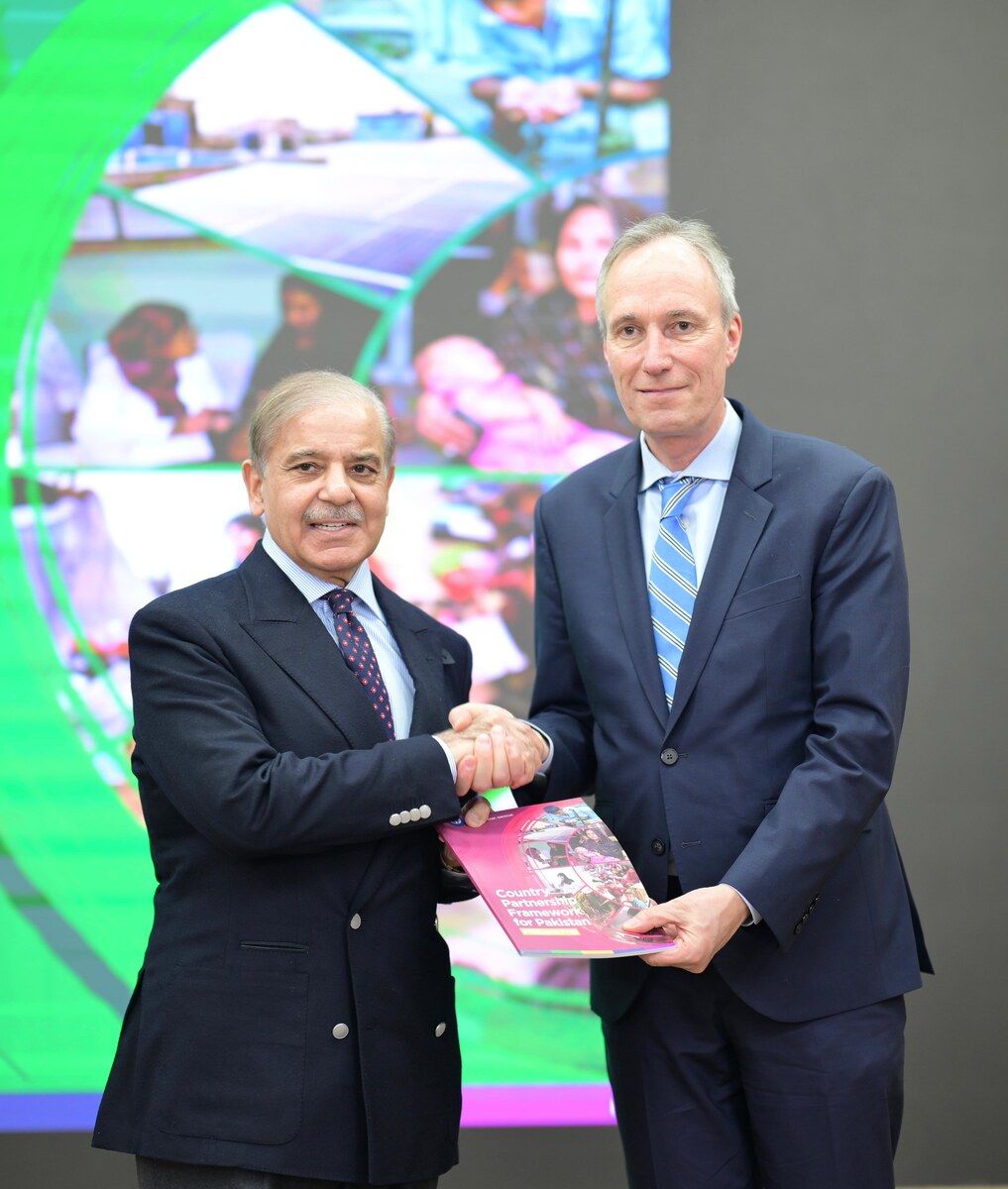
“We hope that the CPF will serve as an anchor for this engagement to keep us on the right track. Partnerships will equally be critical. More resources will be needed to have the impact at the scale that we wish to achieve and this will require close collaboration with all the development partners.”
Speaking at the ceremony, PM Sharif said the CPF was a “vision to transform Pakistan’s economy, building climate resilient projects, alleviating poverty and unemployment and promoting digitization, agriculture and IT led initiatives.”
Separately, Raiser met Ahad Cheema, Pakistani minister for economic affairs, to discuss in detail the framework’s next steps and its implementation.
“The two leaders also discussed the need to address key challenges in project implementation, such as land acquisition, project start-up delays, and ensuring compliance with social safeguards,” Cheema’s office said in a statement.
“Cheema stressed that effective coordination between the World Bank and other development partners, as well as streamlined approval processes, would be essential to overcoming these hurdles.”
Cheema also called on the World Bank to enhance Pakistan’s allocation of concessional resources, especially in support of climate change mitigation and foreign debt management.
Afghans in Pakistan awaiting US resettlement feel betrayal after Trump order

- Nearly 1,660 Afghans cleared by US government to resettle are having flights canceled
- President Trump on inauguration day passed an order suspending US refugee programs
ISLAMABAD: A decision by President Donald Trump’s administration to halt visa processing for refugees has caused uncertainty and shock at an English school for Afghans in Islamabad who are awaiting resettlement in the United States.
Normally enthusiastic students were quiet or crying in class after the news broke on Tuesday, said Sayed Hasseb Ullah, a 20-year-old teacher whose application for resettlement in the US is in process.
Some feel betrayed, with many — including those who fled Taliban rule in Afghanistan — having already spent years in limbo.
“It was really a horrible moment for us. We have been waiting for almost three years and there is no hope anymore,” he told Reuters at the school in Pakistan’s capital.
The sudden delay has upended the plans of many Afghans in Pakistan and left them in despair after undergoing extensive vetting and making preparations for new lives in the US

In an intermediate language class, about half of which had US visa applications in process, a 16-year-old girl broke down in tears.
“I feel very bad from this news,” she said, unable to focus on her work — practicing a list of English phrases for giving formal presentations that was written on the class whiteboard.
She hopes to enroll in high school in the US after being barred from pursuing her education at school in Afghanistan.
The tutoring academy, which has roughly 300 students, is one of the few spaces available for studying for many Afghans waiting for US visas. They cannot legally work or formally study in Pakistan.
Shawn VanDiver, the founder of #AfghanEvac, the leading coalition of resettlement and veterans groups, said there were 10,000-15,000 Afghans in Pakistan waiting for special immigration visas or resettlement in the US as refugees.
Many have waited for years after being instructed when applying to travel to a third country for processing. For many the only option was Pakistan, which borders Afghanistan but, facing economic and security crises, began deporting tens of thousands of Afghans in 2023.
A spokesperson for Pakistan’s foreign ministry did not immediately respond to request for comment on the US announcement.
FLIGHTS CANCELLED?
Nearly 1,660 Afghans cleared by the US government to resettle in the US, including family members of active-duty US military personnel, are having their flights canceled under the order suspending US refugee programs, Reuters reported on Monday.
One of Hasseb Ullah’s students, Fatima, has no idea whether an official email she received on Jan. 14 — and seen by Reuters — seeking documents to proceed with her family’s travel arrangements for the US is still valid.
The 57-year-old women’s rights and development advocate who worked for years for US-funded organizations in central Daikundi province began learning English a few months ago.
She said she had previously never imagined leaving Afghanistan and that she and many others had trusted the US — which spent two decades leading foreign forces in Afghanistan, backing the now-collapsed government and spending billions of dollars on human rights and development programs.
“You supported us at that time and raised us up so we worked with you and after that you invited us to a third country (for visa processing) and now you are doing something like this,” she said.
In addition to concerns about her own safety following her advocacy work, Fatima is particularly worried about her 15-year-old daughter. She hopes she can enroll in school in the US after years out of high school, and that her 22-year-old daughter can complete her engineering degree.
Many students and teachers said they had contacted UN agencies and the US embassy this week and were sharing any information they could find on the Internet in WhatsApp groups. But there were few clear answers.
The US embassy and State Department did not immediately provide comment in request to a question from Reuters on whether the new order would affect Afghans waiting in Pakistan for visas.
“We have been living here for three years with a hope of going to America to be safe but now when President Donald Trump came ... and told us we will not process these case or maybe we will delay it, indeed you feel betrayed,” Hasseb Ullah said.
“I just wanted to tell them respectfully that we have helped you and now we expect help back from you.”
Pakistan parliament passes controversial bill to amend cybercrime law

- Bill proposes Social Media Protection and Regulatory Authority to block illegal online content
- Disinformation will be punishable by three years in prison and fine of $7,150 under new law
ISLAMABAD: Pakistan's National Assembly on Thursday passed a bill to amend the country’s cybercrime law amid a walkout by opposition parties and journalists who fear the new legislation will be used to censor social media platforms.
Pakistan adopted the much-criticized Pakistan Electronic Crimes Act (PECA) in 2016, granting sweeping powers to regulators to block private information they deemed illegal. The law provided for up to seven years in prison for “recruiting, funding and planning of terrorism” online. It also allowed “authorized officers” to require anyone to unlock any computer, mobile phone or other device during an investigation.
The government said at the time restrictions under the new law were needed to ensure security against growing threats, such as terrorism, and to crackdown on unauthorized access, electronic fraud and online harassment. However, journalists and rights activists complain that the law has been largely used to go after journalists, bloggers and other people critical of the government and state institutions like the military.
The new amendment bill now proposes the establishment of the Social Media Protection and Regulatory Authority to perform a range of functions related to social media, including awareness, training, regulation, enlistment and blocking. SMPRA would be able to order the immediate blocking of unlawful content targeting judges, the armed forces, parliament or provincial assemblies or material which promotes and encourages terrorism and other forms of violence against the state or its institutions. The law also makes spreading disinformation a criminal offense punishable by three years in prison and a fine of two million rupees ($7,150).
“Whoever intentionally disseminates, publicly exhibits, or transmits any information through any information system, that he knows or has reason to believe to be false or fake and likely to cause or create a sense of fear, panic or disorder or unrest in general public or society shall be punished with imprisonment which may extend up to three years or with fine which may extend to Rs2m or with both,” a copy of the bill says.
The bill was presented in the National Assembly on Thursday by Federal Minister Rana Tanveer Hussain from the ruling Pakistan Muslim League-Nawaz party of premier Shehbaz Sharif.
“The bill will not harm but protect working journalists,” Information Minister Ataullah Tarar told reporters after the passage of the bill. “This is the first time the government has defined what social media is. There is already a system in place for print and electronic media and complaints can be registered against them.”
He said “working journalists” should not feel threatened by the bill, which had to be passed because the Federal Investigation Agency, previously responsible for handling cybercrime, “does not have the capacity to handle child pornography or AI deep fake cases.”
Tarar said the government was also aiming to bring social media journalists, including those operating YouTube accounts, under the tax framework.
The operative part of the new bill outlines that the Social Media Protection and Regulatory Authority would have the power to issue directions to a social media platform for the removal or blocking of online content if it was against the ideology of Pakistan, incited the public to violate the law or take the law in own hands with a view to coerce, intimidate or terrorize the public, individuals, groups, communities, government officials and institutions, incited the public to cause damage to governmental or private property or coerced or intimidated the public and thereby prevented them from carrying on their lawful trade and disrupted civic life.
The authority will also crackdown on anyone inciting hatred and contempt on a religious, sectarian or ethnic basis as well as against obscene or pornographic content and deep fakes.
Rights activists say the new bill is part of a widespread digital crackdown that includes a ban on X since February last year, restrictions on VPN use and the implementation of a national firewall. The government says the measures are not aimed at censorship.
Pakistan Navy takes over command of CTF-151 anti-piracy force at ceremony in Bahrain

- Task force set up in 2009 in response to piracy attacks in Gulf of Aden, off eastern coast of Somalia
- Pakistan has held command of CTF-151 a record 11 times followed by Turkiye which has led it 7 times
KARACHI: Pakistan Navy has taken over command for the eleventh time of the Combined Task Force-151 (CTF-151), a multinational body set up in 2009 as a response to piracy attacks in the Gulf of Aden and off the eastern coast of Somalia, the navy’s media wing said on Thursday.
CTF-151’s mission is to disrupt piracy and armed robbery at sea and engage with regional and other partners to build capacity and improve relevant capabilities in order to protect global maritime commerce and secure freedom of navigation. It operates in conjunction with the EU’s Operation Atalanta and NATO’s Operation Ocean Shield.
“Change of Command ceremony held at Combined Maritime Forces Headquarters, Bahrain,” the Pakistan navy said in a statement. “Commodore Sohail Ahmed Uzmi of Pakistan Navy appointed as new Commander of Combined Task Force-151.”
Earlier, the command was held by the Turkish Navy. Pakistan has held the command of the CTF-151 force a record 11 times followed by Turkiye, which has led it 7 times.
“Pakistan Navy will continue to work with navies of other countries for peace and stability in the region,” the statement quoted Uzmi as saying.
Command of CTF 151 is rotated between participating nations on a three-to-six-monthly basis. Countries that have led CTF 151 include Bahrain, Brazil, Denmark, Japan, Jordan, Kuwait, Pakistan, the Philippines, New Zealand, Republic of Korea, Singapore, Thailand, Türkiye, the UK, and the US. A variety of countries assign vessels, aircraft, and personnel to the task force.
Pakistan arrests suspected human smuggler behind Morocco migrant boat tragedy

- Boat capsized near Morocco’s coast on Jan. 15 while carrying 86 migrants including 66 Pakistanis
- Moroccan authorities have said 36 people were rescued, survivors include 22 Pakistanis
ISLAMABAD: Pakistan’s Federal Investigation Agency (FIA) said on Thursday it had arrested a human trafficker suspected of illegally sending Pakistanis to Spain on a migrant boat that capsized off the coast of Morocco last week.
The boat capsized near Morocco’s coast on Jan. 15 while carrying 86 migrants, including 66 Pakistanis, according to migrant rights group Walking Borders. Moroccan authorities said a day later 36 people were rescued from the vessel which left Mauritania on Jan. 2, while the Pakistani Foreign Office has said the survivors include 22 Pakistanis.
The tragedy has once again underscored the perilous journeys many migrants, including Pakistanis, embark on due to conflict and economic instability in their home countries.
“Human smuggler involved in Moroccan boat accident arrested,” the FIA said in a statement, identifying the suspect as Muhammad Aslam and saying he was arrested after a raid in the small town of Sambrial in Pakistan’s Punjab province.
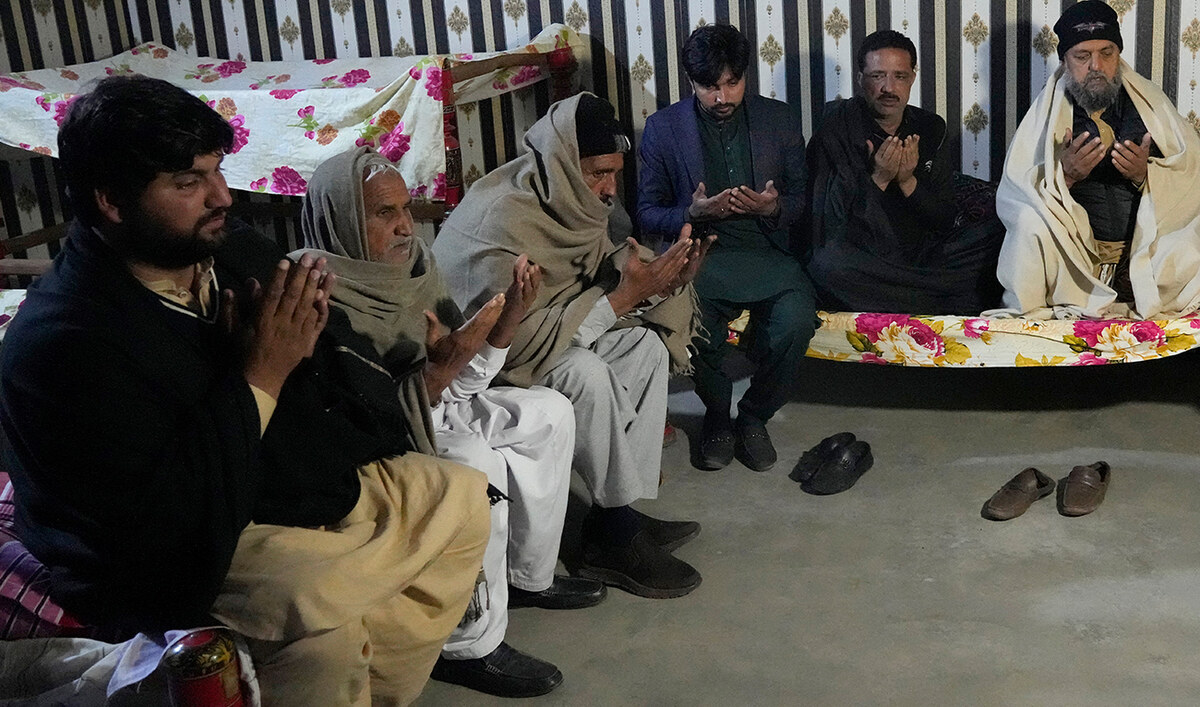
The statement said Aslam and his accomplices had taken Rs5.35 million from the family of Aamir Ali, who died in the boat accident, and had tried to smuggle him to Spain via Mauritania.
“A case has been registered against the accused and an investigation has been launched. More arrests are expected after the accused are identified,” the FIA said.

A record 10,457 migrants, or 30 people a day, died trying to reach Spain in 2024, most while attempting to cross the Atlantic route from West African countries such as Mauritania and Senegal to the Canary islands, according to Walking Borders.
In 2023, hundreds of migrants, including 262 Pakistanis, drowned when an overcrowded vessel sank in international waters off the southwestern Greek town of Pylos, marking one of the deadliest boat disasters ever recorded in the Mediterranean Sea. More recently, five Pakistani nationals died in a shipwreck off the southern Greek island of Gavdos on Dec. 14.
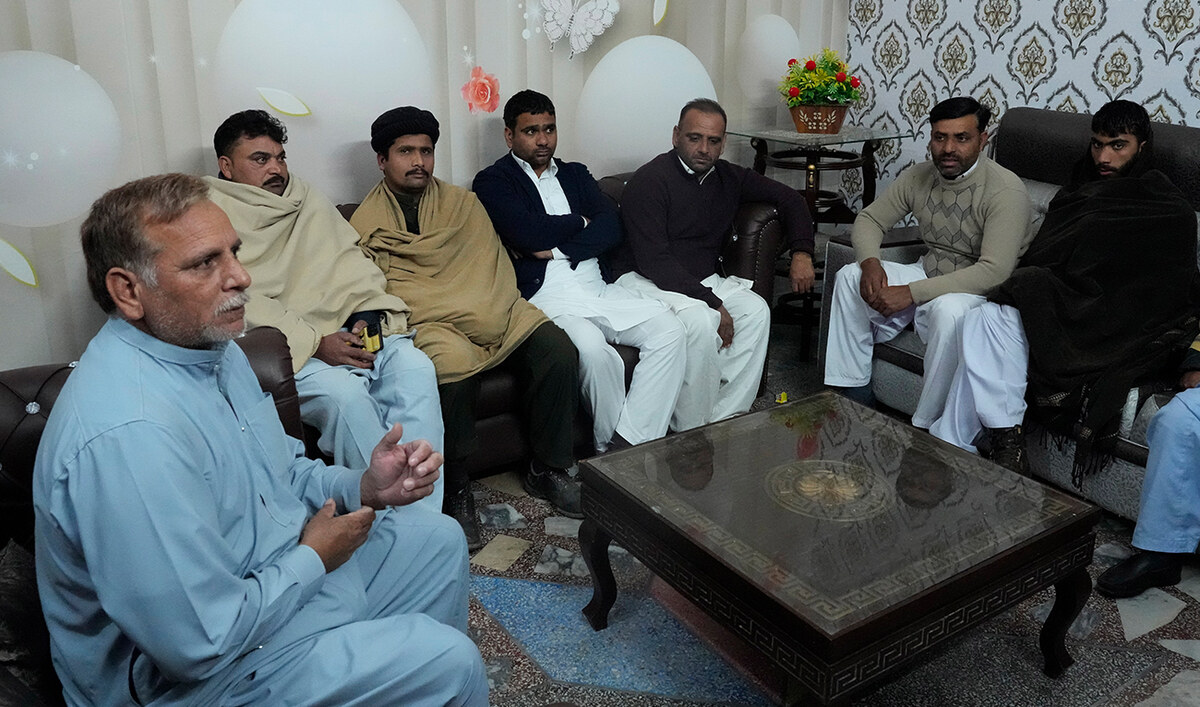
The Pakistani government has ramped up efforts in recent months to combat human smugglers facilitating dangerous journeys for illegal immigrants to Europe, resulting in several arrests.
Prime Minister Shehbaz Sharif has also urged increased collaboration with international agencies like Interpol to ensure swift action against human trafficking networks.
